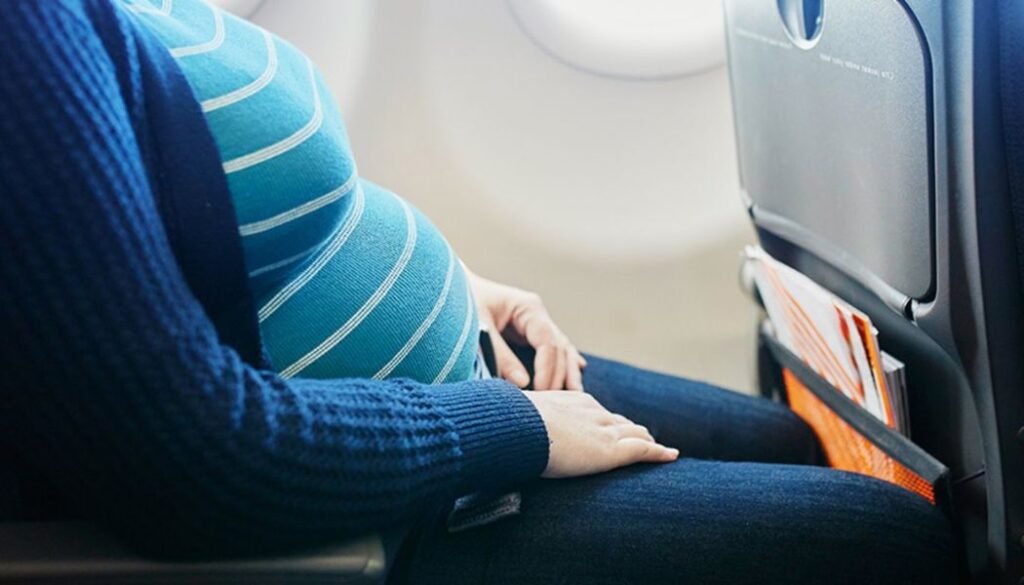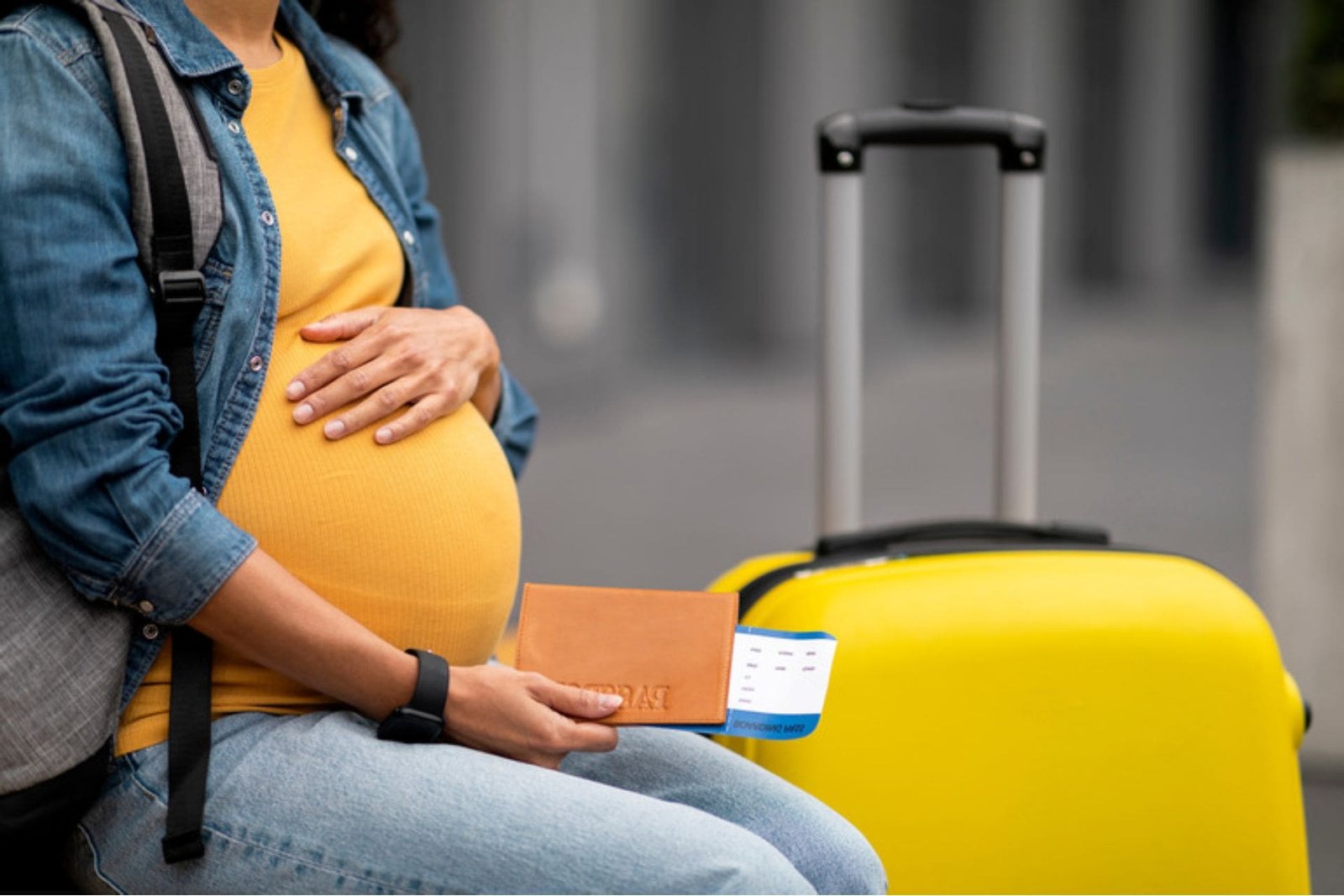Planning a trip when you’re expecting a baby can be exciting but also brings questions. One big question for many moms-to-be is if they can fly on their united airlines flight while pregnant. This blog post will give you all the information regarding united airlines pregnant policy.
We’ll review United’s policy details, including what to do if you have a complicated pregnancy or are carrying more than one baby. We’ll also discuss what happens if you need to change or cancel your flight. Let’s get started with this blog.
United Airlines Pregnancy Rules
Follow the rules below to make your flight more comfortable and stress-free. Check out the united airlines policy for pregnant passengers below:

Flying Before 36 Weeks of Pregnancy
If you are pregnant and less than 36 weeks, united airlines pregnant policy allows you to fly without additional documentation. However, it’s essential to listen to your body and consult with your doctor about the suitability of air travel based on your health and pregnancy possibilities.
Flying at or After 36 Weeks of Pregnancy
Once you reach 36 weeks of pregnancy, united airlines requires a medical certificate from your doctor. This certificate must:
- Be dated within three days of your flight departure.
- Clearly state your calculated due date, which must be after your return flight.
- Show that you are fit to fly.
- As per united airlines policy on pregnancy It’s important to obtain this medical clearance well before your travel to avoid any potential issues at the airport.
Additional Considerations
If you carry twins, triplets, or more, you may need a medical certificate earlier than 36 weeks. Consult with your doctor and united airlines for specific guidance.
- United airlines restricts air travel for ten days following childbirth.
- Given the unpredictable nature of pregnancy, it’s wise to consider purchasing refundable tickets or travel insurance to protect your investment in case of unexpected changes to your travel plans.
Comfort and Safety
Passengers can request an aisle seat for easier access to the restroom.
- Make sure to drink a lot of water onboard to stay hydrated.
- Consider wearing compression socks to promote blood circulation.
- You need to walk around the cabin sometimes so as not to let stiffness and discomfort happen.
Cancellation Due to Pregnancy Complications
If you want to cancel your flight due to pregnancy complications, make sure to know the united airlines cancellation policy for pregnant women first:

- The flexibility of canceling or changing your flight depends on the type of ticket you purchased. Make sure to know that.
- If you experience unexpected pregnancy complications that prevent you from flying, it is essential to contact united airlines as soon as possible.
- A doctor’s note confirming your inability to fly due to pregnancy complications can support your case for potential fee waivers or refunds.
- Travel insurance can provide additional coverage in unexpected circumstances, including pregnancy complications.
Tips for United Airlines Pregnant Policy
It’s very important to take extra care before flying with united airlines. This section will help you have a safe and comfortable flight with united airlines with the tips to follow mentioned below:
- Consult Your Doctor– Always consult your doctor before booking any flight. They can advise on the safest travel time based on your specific pregnancy.
- Understand United’s Policy– Know about united airlines pregnant policy. While most airlines allow travel up to the 36th week of pregnancy for single pregnancies, it’s essential to check the specific rules.
- Travel Insurance– Make sure to buy travel insurance covering your pregnancy-related difficulties.
- Pack Smart– Pack comfortable, loose-fitting clothing. Bring necessary medications, snacks, and hydration.
- Choose Your Seat Wisely– Choose an aisle seat for easy access to the restroom. Bulkhead seats offer extra legroom.
- Inform United– Tell the airline of your pregnancy when booking or at least 72 hours before departure. This allows them to provide necessary assistance.
- Stay Hydrated– Drink plenty of water to combat dehydration, which is common in airplane cabins.
- Move Around– Get up and walk around the cabin every hour to improve circulation.
- Compression Socks– Wear compression socks to reduce swelling and improve blood flow.
- Seatbelt– Always wear your seatbelt low and snug under your belly.
- Request Assistance– Don’t hesitate to ask flight attendants for help with luggage or getting up from your seat.
- Rest– Try to relax and get some rest during the flight. Use a neck pillow and eye mask for comfort.
- Timing Your Flight- Choose a flight during off-peak hours to avoid crowds and stress.
- Bring Necessary Documents– Carry your doctor’s clearance, if required, and any other relevant medical documents.
- Prepare for Discomfort- Bring items like pillows, blankets, and earplugs to enhance comfort.
- Consider a Seat Upgrade- Consider upgrading to a seat with extra legroom for added comfort.
FAQs Section
You only need a doctor’s note in your third trimester (after 28 weeks) as per united airlines pregnant policy. Once you reach 36 weeks, a letter from your obstetrician stating it’s safe for you to travel is required.
The doctor’s note must be dated within three days, including your departure and return dates, and state your estimated due date.
If you’re pregnant with twins or triplets, you’ll need your doctor’s “Fit to Travel” certificate after the 32nd week of pregnancy.
If you have any pregnancy complications, it’s essential to consult your doctor before flying. You might need a doctor’s note or a “Fit to Travel” certificate.
While not mandatory, pregnant passengers often prefer aisle seats for easier access to the restroom.
Yes, the airline offers flexible booking options. You can change or cancel your flight for a travel credit or purchase a refundable ticket.
United airlines prioritizes the comfort and safety of pregnant passengers. While specific assistance might vary, they generally recommend informing the airline about your pregnancy while booking for accommodations.
Most pregnancies progress without complications, and flying is generally considered safe. However, it’s crucial to consult your doctor for personalized advice based on your health condition.
While United airlines’ general policy applies to domestic and international flights, some countries may have specific regulations for pregnant travelers.
Their crews get trained to handle medical emergencies, including childbirth. However, it’s crucial to inform the airline about your pregnancy during booking for necessary arrangements.

